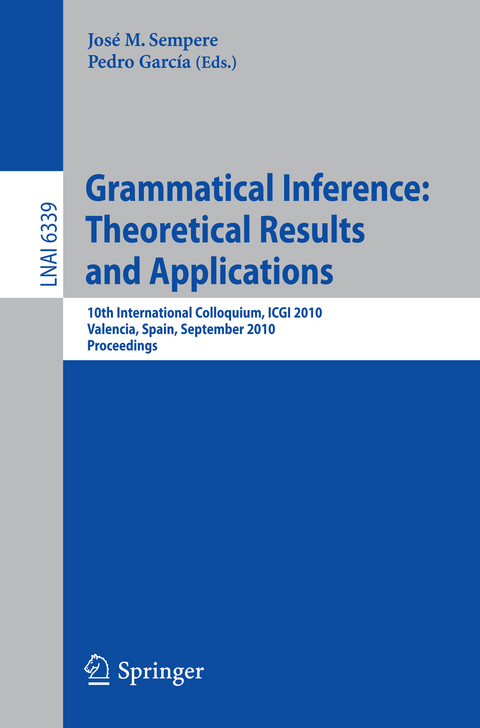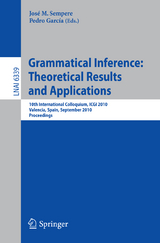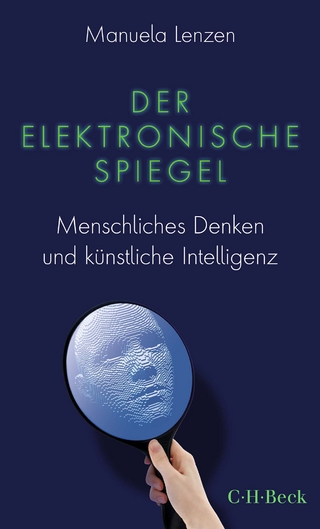Grammatical Inference: Theoretical Results and Applications
Springer Berlin (Verlag)
978-3-642-15487-4 (ISBN)
Invited Talks.- Grammatical Inference and Games: Extended Abstract.- Molecules, Languages and Automata.- Regular Papers.- Inferring Regular Trace Languages from Positive and Negative Samples.- Distributional Learning of Some Context-Free Languages with a Minimally Adequate Teacher.- Learning Context Free Grammars with the Syntactic Concept Lattice.- Learning Automata Teams.- Exact DFA Identification Using SAT Solvers.- Learning Deterministic Finite Automata from Interleaved Strings.- Learning Regular Expressions from Representative Examples and Membership Queries.- Splitting of Learnable Classes.- PAC-Learning Unambiguous k,l-NTS??? Languages.- Bounding the Maximal Parsing Performance of Non-Terminally Separated Grammars.- CGE: A Sequential Learning Algorithm for Mealy Automata.- Using Grammar Induction to Model Adaptive Behavior of Networks of Collaborative Agents.- Transducer Inference by Assembling Specific Languages.- Sequences Classification by Least General Generalisations.- A Likelihood-Ratio Test for Identifying Probabilistic Deterministic Real-Time Automata from Positive Data.- A Local Search Algorithm for Grammatical Inference.- Polynomial-Time Identification of Multiple Context-Free Languages from Positive Data and Membership Queries.- Grammatical Inference as Class Discrimination.- Short Papers.- MDL in the Limit.- Grammatical Inference Algorithms in MATLAB.- A Non-deterministic Grammar Inference Algorithm Applied to the Cleavage Site Prediction Problem in Bioinformatics.- Learning PDFA with Asynchronous Transitions.- Grammar Inference Technology Applications in Software Engineering.- Hölder Norms and a Hierarchy Theorem for Parameterized Classes of CCG.- Learning of Church-Rosser Tree Rewriting Systems.- Generalizing over Several Learning Settings.-Rademacher Complexity and Grammar Induction Algorithms: What It May (Not) Tell Us.- Extracting Shallow Paraphrasing Schemata from Modern Greek Text Using Statistical Significance Testing and Supervised Learning.- Learning Subclasses of Parallel Communicating Grammar Systems.- Enhanced Suffix Arrays as Language Models: Virtual k-Testable Languages.- Learning Fuzzy Context-Free Grammar-A Preliminary Report.- Polynomial Time Identification of Strict Prefix Deterministic Finite State Transducers.
| Erscheint lt. Verlag | 3.9.2010 |
|---|---|
| Reihe/Serie | Lecture Notes in Artificial Intelligence | Lecture Notes in Computer Science |
| Zusatzinfo | XI, 317 p. 47 illus. |
| Verlagsort | Berlin |
| Sprache | englisch |
| Themenwelt | Informatik ► Theorie / Studium ► Künstliche Intelligenz / Robotik |
| Schlagworte | ADA • Algorithm analysis and problem complexity • algorithms • Bioinformatics • Chomsky hierarchy • classification • Complexity • Computational Linguistics • contextual grammars • DNA computing • Evolutionary Computing • grammar induction • Grammatical Inference • Graph Languages • information protocols • Learning Algorithms • Machine Translation • MDL • multidimensional languages • natural language • Neural networks • pattern recognition • Quantum Computing • Robotics • Software engineering • Tree Languages • Turing Machines |
| ISBN-10 | 3-642-15487-5 / 3642154875 |
| ISBN-13 | 978-3-642-15487-4 / 9783642154874 |
| Zustand | Neuware |
| Haben Sie eine Frage zum Produkt? |
aus dem Bereich




